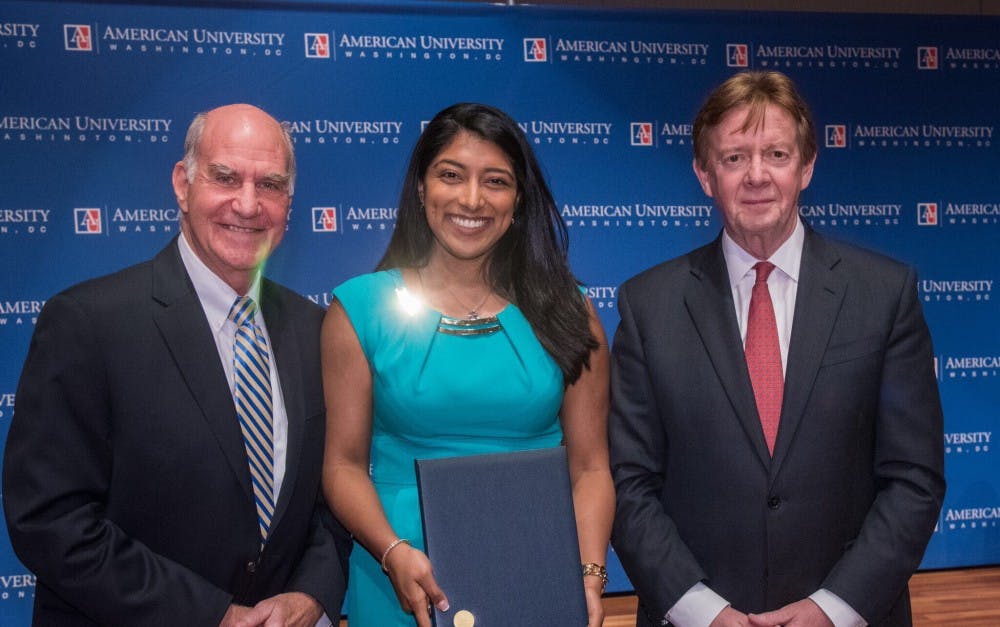AU Ph.D alumna Davina Durgana has received a spot on this year’s “Forbes 30 Under 30" list in the science category.
Forbes “30 Under 30” list is compiled of people younger than 30 years old that are “the brightest young entrepreneurs, innovators and game changers.” Durgana is mentioned in the list’s science category and is 28 years old.
Durgana, who graduated in 2015 from AU created a statistical model, called the Human Vulnerability Diagnostic Tool (HVDT), that tracks human trafficking and its vulnerabilities around the world. She started the statistical model as part of her dissertation at AU, and it is now being used at the Global Slavery Index and at SeraphimGLOBAL, where she is an advisor to the nonprofit on how to implement HVDT in the U.S.
“I knew I wanted to pursue a better way of understanding human trafficking that wasn’t anecdotal, that wasn’t subjective and biased, based on whatever policy makers happened to be in the room,” Durgana said. “I wanted to get a sense of what was actually happening in the field in the most objective way possible.”
The inspiration to start working in human trafficking came after she went on a mission trip to El Salvador when she was an undergraduate at George Washington University and saw the effects of human trafficking on children, Durgana said. Durgana went on this trip to tutor children in English and math.
“It just upset me so deeply to have to leave children that we came to love in such a precarious situation,” Durgana said.
This is what led to her interest in domestic and international human trafficking after working with different firms that work with human trafficking around D.C., Durgana said.
Durgana said she began looking at probability modeling and searching for an array of potential vulnerabilities. She operationalized the U.N. framework of human security theory and looks at seven major vulnerabilities in each area.
The seven vulnerabilities are food, economic, community, personal, political, environmental and health insecurities. Later, she analyzed the vulnerabilities based on already available human trafficking prevalence information to create profiles for countries.
Her model has statistically demonstrated that vulnerability is qualitatively different when disaggregated as it relates to human trafficking and other human rights issues, helping local organizations to better inform their own intervention efforts and anti-trafficking contexts.
“I was really taken away at how prevalent it was in developed countries, like the United States,” Durgana said. “So I really developed a dual expertise in domestic human trafficking as well an international trafficking during my work on the Global Slavery Index.”
After creating HVDT, Durgana now utilizes her model at the Global Slavery Index as a report author, an advisor for SeraphimGLOBAL, as well as working as a senior statistician at the Walk Free Foundation and as a senior practitioner faculty and associate professor at School of International Training (SIT) Graduate Institute.
Besides being recognized on Forbes, Durgana has also received the 2013 Human Trafficking Teardrop Award from Trafficking in America Task Force, and in 2016 the Harry V. Roberts Statistical Advocate of the Year from the American Statistical Association. During her undergraduate graduation from the George Washington University, she was commended for her work by Michelle Obama during the GWU commencement she delivered while serving as first lady.
Durgana has been deemed a human trafficking expert by World Learning, additionally serving on several expert working groups with the Department of Justice National Institute of Justice, the International Conference of Labour Statisticians, and others. Additionally, she has won national and international awards for her work on trafficking. She has been working in her field for eight years.
As for what lies ahead for Durgana, she said that her 20 year plan includes running for office, as well as joining the private sector to work on the transparency and analytics on human trafficking.
“I really feel the pull to public service,” Durgana said. “I probably will be running for office sooner than I planned, but maybe not in the short term; it really depends on how the Democratic Party reorganizes and comes together.”
Speaking on her success, Durgana discussed her experience with being a woman of color as well as a woman in the STEM field.
“I think we do understate how significantly it is biased against minority women,” Durgana said.
“Especially in math and science fields, and how it affects our ability to succeed and our confidence.”
While talking about challenges she has come across in her career so far, Durgana mentioned her personal experience in dealing with ageism, or mistreatment based on age, in her field of work.
“People are always a little bit skeptical, for one thing age is a bit of a limiting factor,” Durgana said. “There have been so many times when I’ve gone to give a talk and someone assumes that I’m my own assistant.”
Durgana also spoke about her perspective on the future of her field and how it deals with diversity.
“I have a lot of hope for a more diverse America,” Durgana said. “I do worry though that while I know the U.S. politics of the moment won’t be the politics of the long term, I worry about what’s going to happen if we don’t appreciate diversity in thought.”





